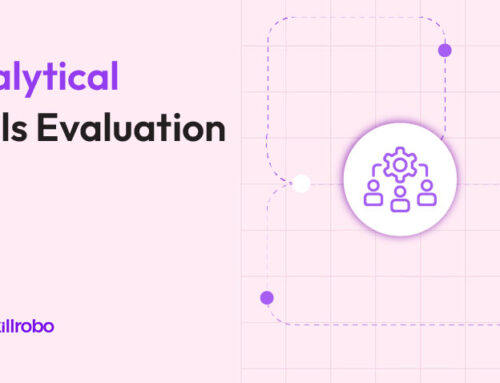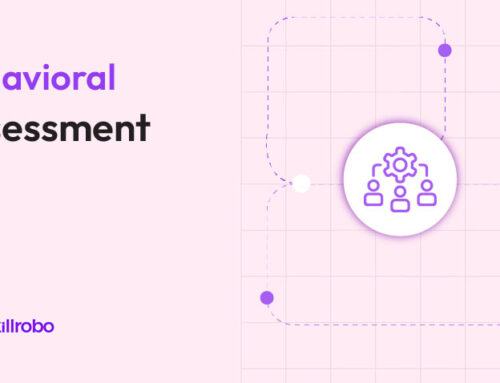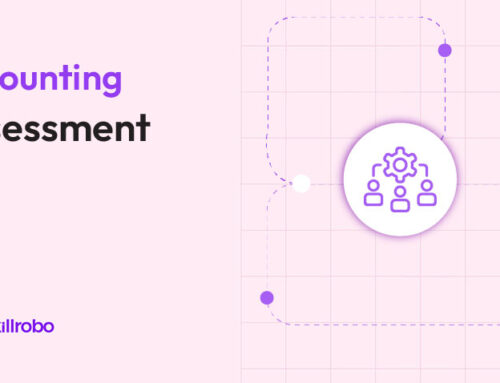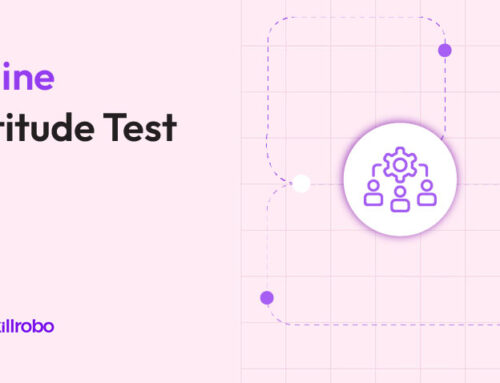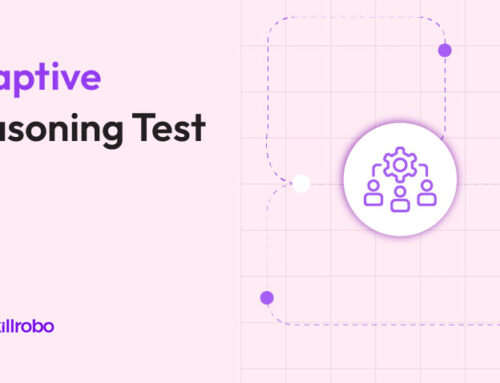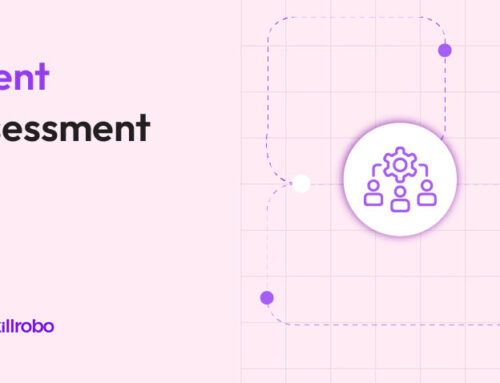Table of Contents
Related articles
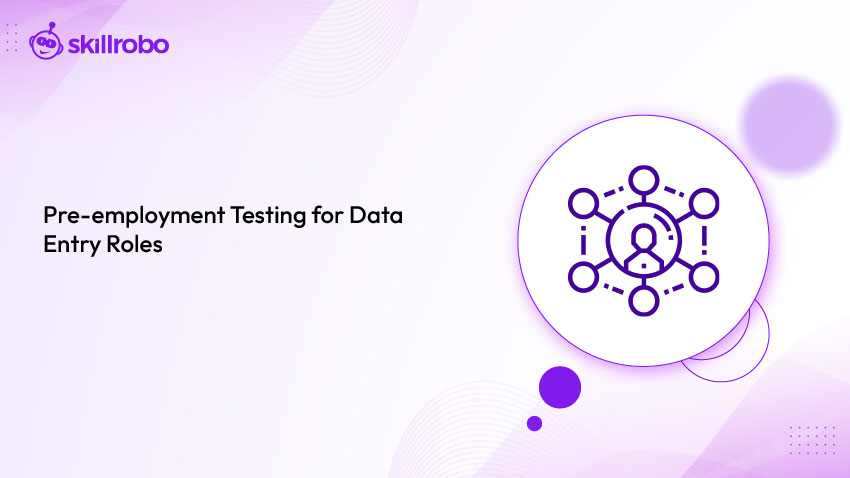
Key Takeaways
- Data entry demands accuracy, speed, and focus, making pre-employment testing critical for quality hires.
- Structured assessments identify candidates who maintain precision under pressure, ensuring reliable data integrity.
- Tests evaluate typing speed, error detection, comprehension, and software navigation for job readiness.
- Skillrobo's platform streamlines test creation and delivery for high-volume, accuracy-driven data entry hiring.
Data entry professionals keep information systems running smoothly, inputting and managing data across platforms. These roles demand speed, precision, and focus, particularly in high-volume environments where errors can wreak havoc on finances, inventories, or customer records. Hiring mistakes lead to costly corrections and data integrity issues. Pre-employment tests are the most effective way to screen candidates who can handle repetitive tasks while maintaining quality. This blog explores pre-employment testing for data entry roles and best practices for assessing data entry candidates, ensuring hires deliver consistent, error-free results in any sector.
Why Data Entry Requires Specialized Screening
Data entry may seem simple, but a single typo can throw off budgets, orders, or databases. Resumes and interviews often fall short—candidates may inflate typing speeds or downplay attention lapses. Standardized tests cut through this, offering objective metrics to confirm skills. A 2024 study found that 68% of hiring managers use skill tests to reduce errors in data-heavy roles. Specialized screening ensures hires thrive under pressure, safeguarding operations and boosting efficiency across industries.
1. Validates Claimed Abilities
2. Minimizes Data Errors
Mistakes ripple through systems. Tasks like spotting mismatches test who prevents errors. A retailer faced inventory losses from typos—screening caught sharper hires. For finance roles, precision is critical. Tests ensure candidates catch issues early, safeguarding data integrity and minimizing costly system fixes.
3. Accelerates Recruitment
4. Ensures Role Fit
Data entry demands focus and dexterity. Form-filling simulations reveal who thrives in repetitive tasks. A mismatched hire quit early—tests fixed it. For clerical roles, fit drives retention. Screening ensures hires align with demands, building stable teams that perform consistently.
5. Scales for Volume Hiring
High-volume roles need rapid evaluation. Typing tests scale for large pools. A firm struggled with mass hiring, but tests simplified it. For seasonal roles, this ensures consistency. Scalable screening delivers hires who meet standards, maintaining quality across growing operations.
Core Skills to Test for Data Entry Positions
Top data entry candidates combine speed, accuracy, and technical know-how. Beyond typing, they need sharp focus to catch errors and skills to navigate systems. Defining these competencies shapes effective tests. A 2023 report noted 65% of data entry errors stem from poor attention to detail.. These five skills ensure hires meet job demands, cutting training and boosting performance in roles from admin to logistics.
1. Typing Speed and Accuracy
2. Attention to Detail
Spotting errors prevents data issues. Tasks like validating entries test focus. A logistics firm faced order errors—detailed tests fixed it. For auditing roles, this is essential. Hires who catch discrepancies ensure clean records, saving time and protecting system reliability.
3. Software Proficiency
Data entry uses tools like Excel or CRMs. Tests on shortcuts or navigation check readiness. A firm retrained unskilled hires—tests avoided this. For admin roles, this cuts onboarding. Proficient hires start fast, handling spreadsheets or databases with ease, boosting output.
4. Reading Comprehension
5. Error Detection
Correcting mistakes matters as much as preventing them. Tasks like spotting dataset flaws test vigilance. A retailer lost revenue to errors; tests improved hires. For finance roles, this is vital. Hires who fix issues ensure data integrity, supporting operational trust.
Recommended Test Formats for Data Entry Evaluation
Effective test formats mirror real-world tasks, balancing automation with job-like conditions. They must assess speed, accuracy, and software skills under pressure. Formats like simulations or timed tasks provide reliable insights into candidate ability. By mimicking actual data entry scenarios, these formats ensure hires are ready for the role, streamlining recruitment and reducing errors across sectors like retail or finance.
1. Timed Typing Tests
These measure WPM and error rates. Candidates type text, with software tracking mistakes. A firm's sloppy hires slowed output; tests fixed it. For high-volume roles, this benchmarks performance. Real-time scoring speeds filtering, ensuring hires meet speed and accuracy standards.
2. Form-Filling Simulations
Candidates input raw data into fields, mimicking CRM or database tasks. A retailer's errors dropped with these tests. For logistics roles, this checks formatting. Scoring accuracy and consistency ensure hires handle structured inputs, critical for finance or admin tasks.
3. Data Validation Exercises
Tasks like matching columns or spotting errors test detailed focus. A firm's unchecked errors cost sales—tests helped. For auditing roles, this is key. Validation exercises ensure hires catch discrepancies, maintaining data quality in high-stakes or repetitive settings.
4. Basic Excel Tasks
5. Instruction-Based Inputs
Text prompts with input tasks test comprehension. Misread forms at a firm caused errors—tests fixed it. For customer data roles, this ensures accuracy. Hires who follow instructions precisely maintain data integrity, vital for roles with complex guidelines.
Advantages of Using Pre-Employment Tests in Data Entry Hiring
Pre-employment tests deliver clear benefits for data entry roles, especially with high applicant volumes or strict accuracy needs. They provide objective metrics, reduce risks, and streamline hiring, ensuring hires meet performance standards. These advantages drive smarter decisions, cut operational costs, and boost workforce quality across industries.
1. Objective Evaluation
2. Faster Onboarding
Hires who meet speed and accuracy standards need less training. A retailer cut onboarding time with skilled hires. For clerical roles, this saves resources. Tests ensure hires start productively, reducing ramp-up and boosting output from day one.
3. Error Reduction
Unqualified hires cause data issues. Tests filter out error-prone candidates. A firm's system crashes dropped with better hires. For finance roles, this protects operations. Screening prevents mistakes, minimizes fixes, and ensures compliance in critical systems.
4. Improved Retention
Role-ready hires stay longer. Tests like simulations show job fit. A mismatched hire quit early—tests helped. For high-volume roles, this cuts turnover. Hires aligned with demands build stable teams, saving recruitment costs long-term.
5. Efficient High-Volume Hiring
Tests scale for large pools, ranking candidates fast. A firm streamlined seasonal hiring with tests. For contract roles, this maintains quality. Automated scoring focuses HR on top talent, ensuring speed and consistency in mass recruitment.
The Role of Skillrobo in Data Entry Assessments
Skillrobo offers a no-code platform to build and deploy tailored data entry tests, featuring drag-and-drop builders, timed typing tasks, and form simulations to assess speed, accuracy, and software skills. Its Seyarc AI crafts role-specific questions, ensuring precision. With real-time scoring, benchmark comparisons, and mobile-friendly access, Skillrobo streamlines high-volume hiring. The reports and analytics on Skillrobo help refine processes, enabling recruiters to screen efficiently and build data teams that deliver error-free results across departments.
Final Thoughts
Data entry hires must excel in precision and speed to keep systems reliable. Pre-employment testing ensures candidates meet these demands, delivering consistent performance under repetitive tasks. By assessing typing, focus, and software skills, tests reduce errors, cut training, and boost retention. They also streamline recruitment, saving time and resources. For businesses relying on accurate data flow, testing is a must. With Skillrobo's flexible platform, you can craft assessments that find top talent fast. Ready to build high-performing data teams? Sign up today to transform your hiring.

Key Takeaways
- Data entry demands accuracy, speed, and focus, making pre-employment testing critical for quality hires.
- Structured assessments identify candidates who maintain precision under pressure, ensuring reliable data integrity.
- Tests evaluate typing speed, error detection, comprehension, and software navigation for job readiness.
- Skillrobo's platform streamlines test creation and delivery for high-volume, accuracy-driven data entry hiring.
Data entry professionals keep information systems running smoothly, inputting and managing data across platforms. These roles demand speed, precision, and focus, particularly in high-volume environments where errors can wreak havoc on finances, inventories, or customer records. Hiring mistakes lead to costly corrections and data integrity issues. Pre-employment tests are the most effective way to screen candidates who can handle repetitive tasks while maintaining quality. This blog explores pre-employment testing for data entry roles and best practices for assessing data entry candidates, ensuring hires deliver consistent, error-free results in any sector.
Why Data Entry Requires Specialized Screening
Data entry may seem simple, but a single typo can throw off budgets, orders, or databases. Resumes and interviews often fall short—candidates may inflate typing speeds or downplay attention lapses. Standardized tests cut through this, offering objective metrics to confirm skills. A 2024 study found that 68% of hiring managers use skill tests to reduce errors in data-heavy roles. Specialized screening ensures hires thrive under pressure, safeguarding operations and boosting efficiency across industries.
1. Validates Claimed Abilities
2. Minimizes Data Errors
Mistakes ripple through systems. Tasks like spotting mismatches test who prevents errors. A retailer faced inventory losses from typos—screening caught sharper hires. For finance roles, precision is critical. Tests ensure candidates catch issues early, safeguarding data integrity and minimizing costly system fixes.
3. Accelerates Recruitment
4. Ensures Role Fit
Data entry demands focus and dexterity. Form-filling simulations reveal who thrives in repetitive tasks. A mismatched hire quit early—tests fixed it. For clerical roles, fit drives retention. Screening ensures hires align with demands, building stable teams that perform consistently.
5. Scales for Volume Hiring
High-volume roles need rapid evaluation. Typing tests scale for large pools. A firm struggled with mass hiring, but tests simplified it. For seasonal roles, this ensures consistency. Scalable screening delivers hires who meet standards, maintaining quality across growing operations.
Core Skills to Test for Data Entry Positions
Top data entry candidates combine speed, accuracy, and technical know-how. Beyond typing, they need sharp focus to catch errors and skills to navigate systems. Defining these competencies shapes effective tests. A 2023 report noted 65% of data entry errors stem from poor attention to detail.. These five skills ensure hires meet job demands, cutting training and boosting performance in roles from admin to logistics.
1. Typing Speed and Accuracy
2. Attention to Detail
Spotting errors prevents data issues. Tasks like validating entries test focus. A logistics firm faced order errors—detailed tests fixed it. For auditing roles, this is essential. Hires who catch discrepancies ensure clean records, saving time and protecting system reliability.
3. Software Proficiency
Data entry uses tools like Excel or CRMs. Tests on shortcuts or navigation check readiness. A firm retrained unskilled hires—tests avoided this. For admin roles, this cuts onboarding. Proficient hires start fast, handling spreadsheets or databases with ease, boosting output.
4. Reading Comprehension
5. Error Detection
Correcting mistakes matters as much as preventing them. Tasks like spotting dataset flaws test vigilance. A retailer lost revenue to errors; tests improved hires. For finance roles, this is vital. Hires who fix issues ensure data integrity, supporting operational trust.
Recommended Test Formats for Data Entry Evaluation
Effective test formats mirror real-world tasks, balancing automation with job-like conditions. They must assess speed, accuracy, and software skills under pressure. Formats like simulations or timed tasks provide reliable insights into candidate ability. By mimicking actual data entry scenarios, these formats ensure hires are ready for the role, streamlining recruitment and reducing errors across sectors like retail or finance.
1. Timed Typing Tests
These measure WPM and error rates. Candidates type text, with software tracking mistakes. A firm's sloppy hires slowed output; tests fixed it. For high-volume roles, this benchmarks performance. Real-time scoring speeds filtering, ensuring hires meet speed and accuracy standards.
2. Form-Filling Simulations
Candidates input raw data into fields, mimicking CRM or database tasks. A retailer's errors dropped with these tests. For logistics roles, this checks formatting. Scoring accuracy and consistency ensure hires handle structured inputs, critical for finance or admin tasks.
3. Data Validation Exercises
Tasks like matching columns or spotting errors test detailed focus. A firm's unchecked errors cost sales—tests helped. For auditing roles, this is key. Validation exercises ensure hires catch discrepancies, maintaining data quality in high-stakes or repetitive settings.
4. Basic Excel Tasks
5. Instruction-Based Inputs
Text prompts with input tasks test comprehension. Misread forms at a firm caused errors—tests fixed it. For customer data roles, this ensures accuracy. Hires who follow instructions precisely maintain data integrity, vital for roles with complex guidelines.
Advantages of Using Pre-Employment Tests in Data Entry Hiring
Pre-employment tests deliver clear benefits for data entry roles, especially with high applicant volumes or strict accuracy needs. They provide objective metrics, reduce risks, and streamline hiring, ensuring hires meet performance standards. These advantages drive smarter decisions, cut operational costs, and boost workforce quality across industries.
1. Objective Evaluation
2. Faster Onboarding
Hires who meet speed and accuracy standards need less training. A retailer cut onboarding time with skilled hires. For clerical roles, this saves resources. Tests ensure hires start productively, reducing ramp-up and boosting output from day one.
3. Error Reduction
Unqualified hires cause data issues. Tests filter out error-prone candidates. A firm's system crashes dropped with better hires. For finance roles, this protects operations. Screening prevents mistakes, minimizes fixes, and ensures compliance in critical systems.
4. Improved Retention
Role-ready hires stay longer. Tests like simulations show job fit. A mismatched hire quit early—tests helped. For high-volume roles, this cuts turnover. Hires aligned with demands build stable teams, saving recruitment costs long-term.
5. Efficient High-Volume Hiring
Tests scale for large pools, ranking candidates fast. A firm streamlined seasonal hiring with tests. For contract roles, this maintains quality. Automated scoring focuses HR on top talent, ensuring speed and consistency in mass recruitment.
The Role of Skillrobo in Data Entry Assessments
Skillrobo offers a no-code platform to build and deploy tailored data entry tests, featuring drag-and-drop builders, timed typing tasks, and form simulations to assess speed, accuracy, and software skills. Its Seyarc AI crafts role-specific questions, ensuring precision. With real-time scoring, benchmark comparisons, and mobile-friendly access, Skillrobo streamlines high-volume hiring. The reports and analytics on Skillrobo help refine processes, enabling recruiters to screen efficiently and build data teams that deliver error-free results across departments.
Final Thoughts
Data entry hires must excel in precision and speed to keep systems reliable. Pre-employment testing ensures candidates meet these demands, delivering consistent performance under repetitive tasks. By assessing typing, focus, and software skills, tests reduce errors, cut training, and boost retention. They also streamline recruitment, saving time and resources. For businesses relying on accurate data flow, testing is a must. With Skillrobo's flexible platform, you can craft assessments that find top talent fast. Ready to build high-performing data teams? Sign up today to transform your hiring.



